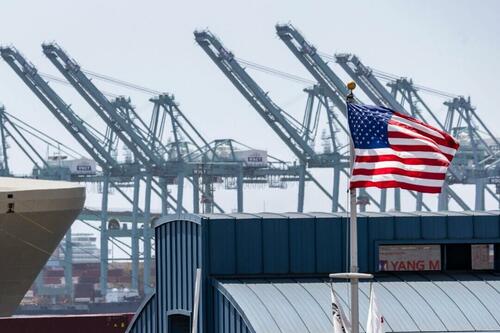Authored by Christian Milord via The Epoch Times,
For as long as trade has existed, there have been duties, fees, levies, tariffs, or taxes that have been applied in all shapes and sizes on goods entering a country. Some folks continue to promote the idea that free trade exists, but it has never truly existed.
Fair and free trade might be an ideal vision worth working toward, but it is common knowledge that nations operate in their own interests and often bend trade agreements.
Up until the 1940s, the United States utilized a range of tariffs to grab a major portion of world trade.
For decades, the United States has helped to subsidize much of the world both economically and through its broad security umbrella.
This was part of an attempt to forge more global allies as well as assist with economic development. However, many nations came to depend on the American gravy train, yet at the same time protected their own markets through tariffs and other barriers to foreign businesses that wanted to compete in their markets. This imbalance has become unsustainable.
President Donald Trump’s threat of slapping tariffs on a whole host of nations was carried out for a number of reasons.
Trump is zeroing in on the worst trade barrier offenders, most of which are in Asia. They enjoy trade surpluses due to high fees charged on imported foreign goods, currency manipulation, government-subsidized industries, and the dumping of cheap products abroad. These actions distort fair and free market forces.
In order to recalibrate trade and reduce our trade deficit, reciprocal tariffs will be paused for 90 days on nations that are actually opposed to free trade but are willing to change course. Uncertain times create market gyrations, but the stock market is often driven by events, investor sentiment, and speculation. It represents only partial aspects of the overall economy, while small businesses are a large portion of the economy.
Feigned outrage emanating from many capitals regarding America’s “bullying” tactics is ironic, because for decades, foes and “friends” alike have already targeted U.S. goods with taxes and subsidies. Some countries, such as China, have also used a Value Added Tax (VAT), while their goods work their way through a number of countries before arriving at a final destination. China has victimized both its adversaries and allies for decades with unfair trade.
For many years, America has allowed foreign nations to take us to the cleaners by protecting their own markets as they charge exorbitant fees on very specific American goods. However, while the United States has allowed an array of cheaper products to be imported, many nations make it almost impossible for our companies to penetrate their economies.
This has adversely affected American workers as well as consumer and government debt. Moreover, many products from developing nations lack the labor standards and quality control mechanisms that are taken for granted in the West.
However, there might be some good news on the horizon.
We have an administration that finally has acted to place the national interest first instead of accommodating nations that practice predatory trade through barriers and obscene levels of taxes on American goods.
Threatening reciprocal tariffs on high-tariff nations can have a number of effects.
First, more pliable nations will be eager to negotiate to either eliminate their trade barriers or reduce them so that supply chains can continue with the United States. These events are beginning to unfold as over 70 nations are willing to come to the table.
Next, some developed countries will also be open to bargaining, while others might retaliate with targeted barriers to American goods and investments. China, along with several European Union nations, is the main culprit in protectionist trade while claiming to practice free trade. The Trump team could arm-twist resistant Asian and European allies to lower barriers, or else our military security presence will be diminished, and they will have to fend for themselves against adversaries.
Third, the application of stiff tariffs on China is likely the opening salvo in eventual decoupling from the country in trade that affects our national security. The United States needs leverage against a nation that bribes, cheats, and deceives in the global economy in a form of economic warfare. China has never truly kept the promises it has made as a recipient of our “most favored nation” status and under World Trade Organization (WTO) agreements.
Nations that abide by the WTO’s rules of commerce can also start to distance themselves from trade with China in favor of friendlier markets and perhaps achieve greater self-reliance in manufacturing. If particular nations slash or drop their tariffs and trade walls, the United States can pause on tariffs in the coming months. That could set in motion genuine competition minus market distortions. However, there must be “trust but verify” protocols in place to ensure that any barriers and tariff loopholes don’t rise again like a phoenix. Consequently, fairer and freer trade could possibly ensue over the long term.
According to transactional Trump, who often turns on a dime with decisions, deals are always possible even with recalcitrant nations.
If tariffs are lowered across the board and key manufacturing can make a comeback here at home, real prosperity is a strong probability.
Combine that with domestic deregulation, government downsizing, and long-term tax cuts, and economic growth will accelerate. This, in turn, can increase tax revenues, which can help to tackle the national debt and yearly deficits—and unleash the proverbial golden age.
* * *
Views expressed in this article are opinions of the author and do not necessarily reflect the views of The Epoch Times or ZeroHedge.
Loading...
